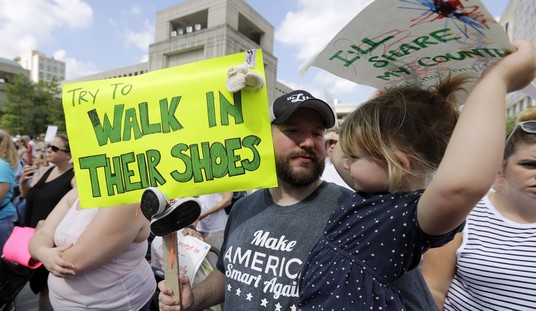Often it seems the federal public health agencies are of one mind regarding how to handle the COVID-19 pandemic. The corporate media reinforces this idea by only talking to a select number of “experts” who are often the political appointees that lead our public health agencies. All of them push vaccines, vaccine mandates, and boosters, aligned with the message from the White House. Unfortunately, this trend has led to the politicization of public health information that has damaged many Americans’ trust and confidence in the CDC, FDA, and NIH.
Dr. Anthony Fauci is the most prominent media guest, and his favorability continues to decline as the pandemic drags on. In late October, a plurality of likely voters felt the octogenarian immunologist should resign. He leads the National Institute of Allergy and Infectious Disease (NIAID). He does not lead the NIH, though many Americans may believe he does. Over the Thanksgiving weekend, he made multiple corporate media appearances. He encouraged mass vaccination for COVID-19, pushed COVID vaccines for children, supported vaccine mandates, and predicted toddlers would be eligible for the vaccine in the first quarter of 2022.
On Face the Nation, Fauci told host Margaret Brennan, “We know exactly what needs to be done. We know we’ve got to get vaccinated.” Given his straightforward assertion, some may assume there is consensus within the NIH that vaccines are necessary to manage the pandemic. However, according to the Wall Street Journal, there are dissenting points of view. On Dec. 1, the agency will live stream a roundtable session on the subject of vaccine mandates.
“There’s a lot of debate within the NIH about whether [a vaccine mandate] is appropriate,” David Wendler, a senior NIH bioethicist in charge of planning the event, told the Journal. “It’s an important, hot topic.” Dr. Matthew Memoli, director of the Laboratory of Infectious Diseases, Clinical Studies Unit (CSU) at NIH, will be representing the anti-mandate perspective. He is currently unvaccinated against COVID-19 and has applied for a religious exemption. If the government denies the exemption, his remaining unvaccinated will put his job and his medical license in the District of Columbia at risk.
Recommended: Dr. Anthony Fauci Spends an Hour Pontificating on TV—and Proves He’s A Partisan Hack
The CSU lab that Memoli leads studies human influenza and other emerging viral infections using healthy volunteers. Memoli has worked on vaccine development for the flu and diseases like Zika and Dengue. He completed an infectious disease fellowship in NIAID, the division of the NIH run by Fauci, before joining the NIH permanently. Memoli reportedly sent an email to Fauci saying he felt that the way we are using the COVID vaccines is wrong. Memoli told the WSJ he supports vaccinating high-risk populations but worries blanket vaccination of low-risk individuals could hamper the development of robust immunity in the population.
This roundtable is important because we learned information that does not get widely reported in previous live streams from the agencies. The vaccine advisory committees for the FDA and the CDC did not recommend COVID booster vaccines for everyone when they met. They advised them for the elderly over 65 and immunocompromised. Unless you watched the meetings, you might not know that, since the political appointees who run the agencies overruled the experts and recommended them broadly.
Another example comes from the discussion at the FDA advisory committee about vaccine side effects when Dr. Doran Fink, a deputy director at the FDA, was asked about the risk of myocarditis post-vaccine. He answered, “If you look at the healthcare claims data, you see that there is evidence of some attributable risk at all age groups, although, the older you get, the higher the risk of complications from COVID that offset the risk of myocarditis,” he said. “So, when you look at the balances of risk versus benefit, what we really start to see is risk of myocarditis being higher [than COVID-19] in males under age 40.”
While other nations have acknowledged that risk with mRNA vaccines, and some have limited their use by age, the corporate media never mentions it other than as a “rare” side effect. No one asks the “experts” about the risk-benefit ratio in exact terms except in that one meeting that was live-streamed. That data should have made vaccinating healthy men under 40 forbidden under basic principles of medical ethics. You do not give treatment when it is more likely to cause harm than the illness you are trying to prevent. Hopefully, Memoli will raise this point.
Related: Politics, Not Science, Is Dictating Biden’s COVID Decisions
We also learned an essential nugget in the FDA discussion about vaccines for children aged five to 11. The pharmaceutical companies and regulatory agencies have no idea how safe these vaccines are for children in the short term or the long term. During the panel’s conversation, Dr. Eric Rubin, a Harvard professor and editor-in-chief of the New England Journal of Medicine, said (emphasis added):
The data show that this vaccine works and it’s pretty safe … And yet, we’re worried about a side effect that we can’t measure yet, but it’s probably real. And we see a benefit that isn’t that same as it is in older patients […]
It’s a very, sort of, personal choice. If I had a child who was a transplant recipient, I would really want to be able to use a vaccine. And there are certain kids who probably should be vaccinated. The question of how broadly to use I think is a substantial one. And I know it’s not question, and I know we’re kind of punting that to ACIP. [CDC vaccine advisory committee]
But I do think that it’s a relatively close call. As Dr. [Ofer] Levy just said, and Dr. [Hayley] Gans said, it really is going to be a question of what the prevailing conditions are. But we’re never going to learn about how safe this vaccine is unless we start giving it. That’s just the way it goes. That’s how we found out about rare complications of other vaccines like coronavirus vaccine. And I do think we should vote to approve it.
Rubin advocated using otherwise healthy children as guinea pigs for a vaccine that reduces the severity of an illness that does not make children severely ill. We should all hope this makes it into the roundtable discussion on mandates. Memoli’s specific objection to the vaccine mandate indicates he recognizes recovered immunity. That is another important subject that he should raise. In his comments, Memoli seems determined to bring a dissenting view to the debate. Hopefully, he will make robust, data-driven arguments in the forum, unlike the agency heads and television doctors who frequent corporate media coverage.
The roundtable, called “Grand Rounds,” was signed off on by Christine Grady, head of the NIH’s Clinical Center bioethics department. Hilariously, she is also Dr. Anthony Fauci’s wife. In an email to the Journal, a spokeswoman said there is interest in this debate across the NIH and that “the December Grand Rounds will be relevant to discussions around the country regarding vaccine mandates.” While the Grand Rounds will not determine government policy, the information should inform political leaders about vaccine mandates’ risks, benefits, and ethics. The NIH live streams sessions on its YouTube channel at noon on Dec. 1, 2021. If you are unable to watch it live, it will be archived on the NIH website.










